
Our very own medical secretary Cheryl Rutt had the opportunity to travel to the Hospital of Hope in Mango, Togo West Africa this January for two weeks to serve as part of a medical mission team. Read her inspiring story below:
In January of this year I had an amazing opportunity to travel to the Hospital of Hope in Mango, Togo West Africa to serve for two weeks as part of a medical mission team. The Hospital of Hope opened its doors in March 2015 to serve the people of Africa in a Christian environment. Chaplains, doctors and nurses care for the physical, emotional and spiritual needs of the patient.
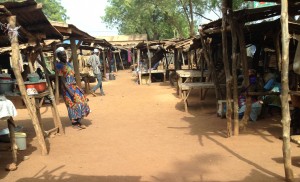 Prior to leaving on the trip, various medical supplies were collected such as infant formula, adult and children’s’ vitamins, various other medications, stethoscopes for the nurses, pen lights for the doctors, wound care supplies, thermometers, needles, and syringes. Thanks to the Lancaster NeuroScience family and other donors we were able to take 25 large suitcases full of supplies for the hospital. Our team was concerned about going through security and customs with all the supplies and the possibility of airport employees in Africa expecting bribes, but fortunately, we had no problems.
Prior to leaving on the trip, various medical supplies were collected such as infant formula, adult and children’s’ vitamins, various other medications, stethoscopes for the nurses, pen lights for the doctors, wound care supplies, thermometers, needles, and syringes. Thanks to the Lancaster NeuroScience family and other donors we were able to take 25 large suitcases full of supplies for the hospital. Our team was concerned about going through security and customs with all the supplies and the possibility of airport employees in Africa expecting bribes, but fortunately, we had no problems.
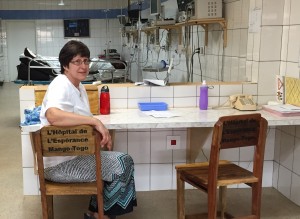 While at the Hospital of Hope, we organized medical supply closets and did inventory on medical supplies and medications. Several nurses were assigned to the Women’s Ward in Labor and Delivery. During our two weeks at the hospital, premature twins were delivered, unfortunately one did not survive. Premature births are common due to the high incidents of malaria and poor nutrition. I was assigned to admit patients to the recovery room, monitoring vital signs after surgery and transporting patients to and from their ward to the surgical wing. Interestingly, surgery performed at the hospital is normally done under spinal or local anesthesia. Very rarely do they use general anesthesia. The majority of surgical cases are done by a physician assistant since they do not yet have a full time surgeon. They do have volunteer surgeons who come in periodically for several weeks at a time to do the more difficult cases. Most common types of surgeries done are removal of cancerous tumors, appendectomies, hysterectomies, surgically treating infections in joints and many other orthopedic surgeries. Orthopedic procedures such as setting and casting broken bones, ankle fusions, and shoulder dislocations are common because of the many motorcycle or “moto” accidents in that country.
While at the Hospital of Hope, we organized medical supply closets and did inventory on medical supplies and medications. Several nurses were assigned to the Women’s Ward in Labor and Delivery. During our two weeks at the hospital, premature twins were delivered, unfortunately one did not survive. Premature births are common due to the high incidents of malaria and poor nutrition. I was assigned to admit patients to the recovery room, monitoring vital signs after surgery and transporting patients to and from their ward to the surgical wing. Interestingly, surgery performed at the hospital is normally done under spinal or local anesthesia. Very rarely do they use general anesthesia. The majority of surgical cases are done by a physician assistant since they do not yet have a full time surgeon. They do have volunteer surgeons who come in periodically for several weeks at a time to do the more difficult cases. Most common types of surgeries done are removal of cancerous tumors, appendectomies, hysterectomies, surgically treating infections in joints and many other orthopedic surgeries. Orthopedic procedures such as setting and casting broken bones, ankle fusions, and shoulder dislocations are common because of the many motorcycle or “moto” accidents in that country.
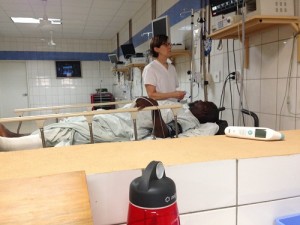 If you are the patient, it is your family’s responsibility to bathe and feed you and take care of your laundry while you are at the hospital. There is an area set aside on the hospital compound for patient’s families to sleep, cook over an open fire and do laundry due to the great distances the people travel to be treated. Patients travel for miles, sometimes days to be seen either in the clinic or to be admitted to the hospital. There is no medical insurance but patients rely on relatives to help pay their medical fees. Patients are charged a nominal fee for medical services, but no one is turned away if unable to pay.
If you are the patient, it is your family’s responsibility to bathe and feed you and take care of your laundry while you are at the hospital. There is an area set aside on the hospital compound for patient’s families to sleep, cook over an open fire and do laundry due to the great distances the people travel to be treated. Patients travel for miles, sometimes days to be seen either in the clinic or to be admitted to the hospital. There is no medical insurance but patients rely on relatives to help pay their medical fees. Patients are charged a nominal fee for medical services, but no one is turned away if unable to pay.
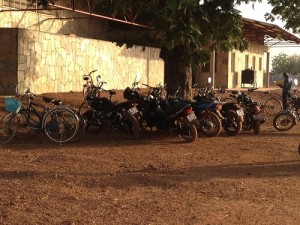 There were several on our team who were non-medical but provided an important service while on the trip. Several men built kitchen cabinets for a missionary family and also built a screen door and a divider of book shelves for a one room school for the missionary children. A kitchen is considered a luxury so normally a table and a shelf serve as a kitchen. The book shelves for the school will divide one large room into two smaller classrooms. Other men on our team helped on the hospital compound farm and harvested bean stalks with local Togolese farmers that will be used to feed farm animals.
There were several on our team who were non-medical but provided an important service while on the trip. Several men built kitchen cabinets for a missionary family and also built a screen door and a divider of book shelves for a one room school for the missionary children. A kitchen is considered a luxury so normally a table and a shelf serve as a kitchen. The book shelves for the school will divide one large room into two smaller classrooms. Other men on our team helped on the hospital compound farm and harvested bean stalks with local Togolese farmers that will be used to feed farm animals.
We were fortunate to serve in Africa during the cool, dry season as the temperatures were only in the 100-110 degree range. At night the temperature did drop into the 70’s and the local people were bundled up! There was always a warm breeze called the Harmattan. This is a dusty breeze coming from the Sahara desert that blows across the region and filters the sun. Due to the fact that we were close to the equator, day and night were the same length; basically 12 hours of light and 12 hours of darkness. It is dark by 6:15 pm all year.
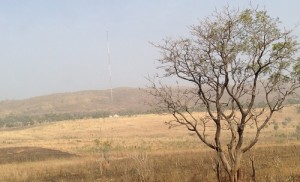 It is quite interesting that even though there is little medical care, housing is suboptimal, and farms produce little, most everyone has a cell phone, even those who are illiterate. In the middle of the Africa plains there are cell towers!
It is quite interesting that even though there is little medical care, housing is suboptimal, and farms produce little, most everyone has a cell phone, even those who are illiterate. In the middle of the Africa plains there are cell towers!
The interaction between our team and the Togolese people was limited due to the language barrier. The official language is French but everywhere we went there was always a smile and a “Bonjour” to make it an amazing trip.



